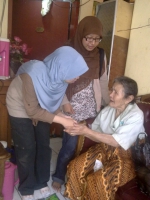ITB Jatinangor Campus Arranged Community Service at Jungkang and Cilembu Villages
By Adi Permana
Editor Adi Permana

BANDUNG, itb.ac.id — As one of the elements stated in the three pillars of higher education, community service is every institute's mission and commitment. Recently, students of the ITB Jatinangor campus organized their community service at Jingkang and Cilembu Villages located in the Sumedang Regency.
Before delving into action, the program's socialization led by Lili Melani, Ph.D. (Bioengineering Study Program lecturer) was held for all students on the Jatinangor campus on Tuesday (12/7/2022). The sharing session titled "The First Steps of Our Service to Sumedang" presented the preliminary overview of the upcoming community service.
The community service aims to revitalize the learning atmosphere and contribute to the local communities. With eight study programs participating this year, the welfare will urge students and professors from their corresponding fields to work together.

“Some study programs in Jatinangor had initially united to plan an activity that brings support to nearby residents. Thus, this community service is established in hopes of bringing many benefits to these villages,” Lili outlined.
Held from August to December, the eight study programs will team up to explore the two major themes given by the committee. The first theme centers around maximizing both the value of rhizomes and waste management at Jingkang Village. The latter theme, on the other hand, focuses on innovations in the cultivation and diversification of yam-based products at Cilembu Village. Students are encouraged to solve these problems by brainstorming the required system, tools, standard procedures, and prototypes.
“The output target of this program are the created products, system, tools, infrastructures, management, and standard procedures proved to be easily applied by the locals,” Lili added.
Lili also explained that all students will be randomly assigned to different groups posted at separate locations. Each location will receive an equal allocation of human resources from different study fields so that the issues can be resolved via the implementation of various disciplines.
“Students from their respective study programs will solve the problem specific to their specialty. For instance, cases concerning agricultural irrigation systems will be dealt with by students from the Water Resource Engineering and Management Study Program, whereas waste management matters will be handled by the Bioengineering and Bioenergy students.”
The community service integrates its themes with materials taught in classes such that the activities and workload are directed and structured, according to ITB's credit conversion. Since the program will last for one semester, visitation to the village is not done every day; instead, visits are done routinely outside class periods. The briefing will start in early August, followed by the program's commencement and the first visit during the third week. In the first week of December, students are expected to prepare their final prototypes to be exhibited the following week.
Reporter: Hanifa Juliana (Urban and Regional Planning, 2022)
Translator: Ruth Nathania (Environmental Engineering, 2019)

.jpg)
.jpg)
.jpg)
.jpg)
.jpg)



